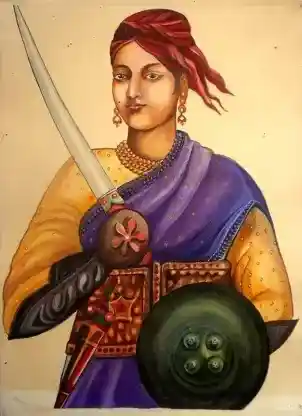
In the tapestry of Indian history, woven with tales of valor and sacrifice, one name that stands out in relative obscurity is that of Jhalkaribai. An unsung heroine of the Indian Rebellion of 1857, her story unfolds as a testament to courage, resilience, and a fervent commitment to freedom. Though her narrative has often been overshadowed by more prominent figures of the rebellion, Jhalkaribai’s indomitable spirit deserves recognition and remembrance.
Born in 1830 in the village of Bhojla, near Jhansi, Jhalkaribai belonged to the Kori community, a Dalit caste. Her early years were marked by simplicity and an innate curiosity about the world around her. Her given name was actually Manikarnika, the same as the Rani of Jhansi, the iconic figure in whose service Jhalkaribai would eventually find her destiny intertwined.
Jhalkaribai’s life took a decisive turn when she joined the army of the Queen of Jhansi. As a young girl, she exhibited exceptional skills in horseback riding and archery. These talents, coupled with her unwavering devotion to the queen, caught the attention of her superiors. Jhalkaribai’s courage and abilities soon propelled her into a position of significance within the ranks of the Jhansi army.
The Indian Rebellion of 1857, often referred to as the Sepoy Mutiny or the First War of Independence, was a watershed moment in the history of colonial India. It was a period marked by widespread discontent against British rule, with various regions erupting in rebellion. Jhansi, under the rule of Rani Lakshmibai, became a focal point of resistance.
During the siege of Jhansi in 1857, as the British forces closed in on the city, Rani Lakshmibai strategized to defend her kingdom. Recognizing the need for a decoy to distract the British, she devised a plan that showcased Jhalkaribai’s remarkable resemblance to herself. Jhalkaribai willingly stepped into this pivotal role, donning the attire of the queen and mounting her horse to lead a contingent of soldiers.
Jhalkaribai’s audacious act successfully diverted the attention of the British forces, allowing Rani Lakshmibai and a group of loyal soldiers to escape the encirclement. This selfless sacrifice demonstrated not only Jhalkaribai’s physical prowess but also her deep commitment to the cause of Indian independence. The consequences, however, were severe. Jhalkaribai was captured by the British and subjected to harsh treatment, yet her spirit remained unbroken.
The saga of Jhalkaribai continues to inspire generations with its blend of sacrifice and valor. Her story is a poignant reminder that the fight for freedom encompassed individuals from diverse backgrounds, and their contributions were not always recorded in the annals of history. Jhalkaribai, a woman from a marginalized community, stood shoulder to shoulder with her queen in the quest for liberty.
In the aftermath of the rebellion, Jhalkaribai’s fate took a tragic turn. She faced captivity and brutal interrogation, enduring the hardships imposed by her captors. Despite the physical and emotional toll, she steadfastly maintained her silence about the whereabouts of Rani Lakshmibai and her compatriots.
Jhalkaribai’s life, while marked by adversity, exemplifies the resilience and determination embedded in the spirit of those who fought against colonial oppression. Her unwavering commitment to the cause of independence challenges the conventional narratives that often overlook the contributions of marginalized communities and women in historical movements.
As the pages of history turn, efforts are underway to bring Jhalkaribai’s story to the forefront. In recent times, her legacy has gained recognition through literature, art, and cultural representations. Books and plays have explored the nuances of her character, shedding light on the complexities of her journey.
In popular culture, Jhalkaribai’s character found a place in the narrative of the 2019 Bollywood film “Manikarnika: The Queen of Jhansi.” While the film drew attention to her role as a decoy, it also sparked conversations about the need for a more comprehensive exploration of her life and contributions.
In conclusion, Jhalkaribai’s tale is a compelling chapter in the history of India’s struggle for independence. Her courage, sacrifice, and resilience deserve acknowledgment and celebration. As we reflect on the past, it becomes imperative to amplify the voices of those, like Jhalkaribai, who defied conventions and made significant but often overlooked contributions to the fight against colonial rule. By recognizing and honoring such unsung heroines, we enrich our understanding of history and pave the way for a more inclusive narrative that embraces the diversity of those who shaped the destiny of a nation.